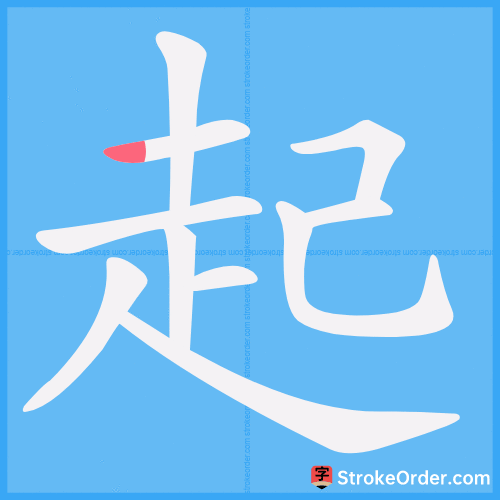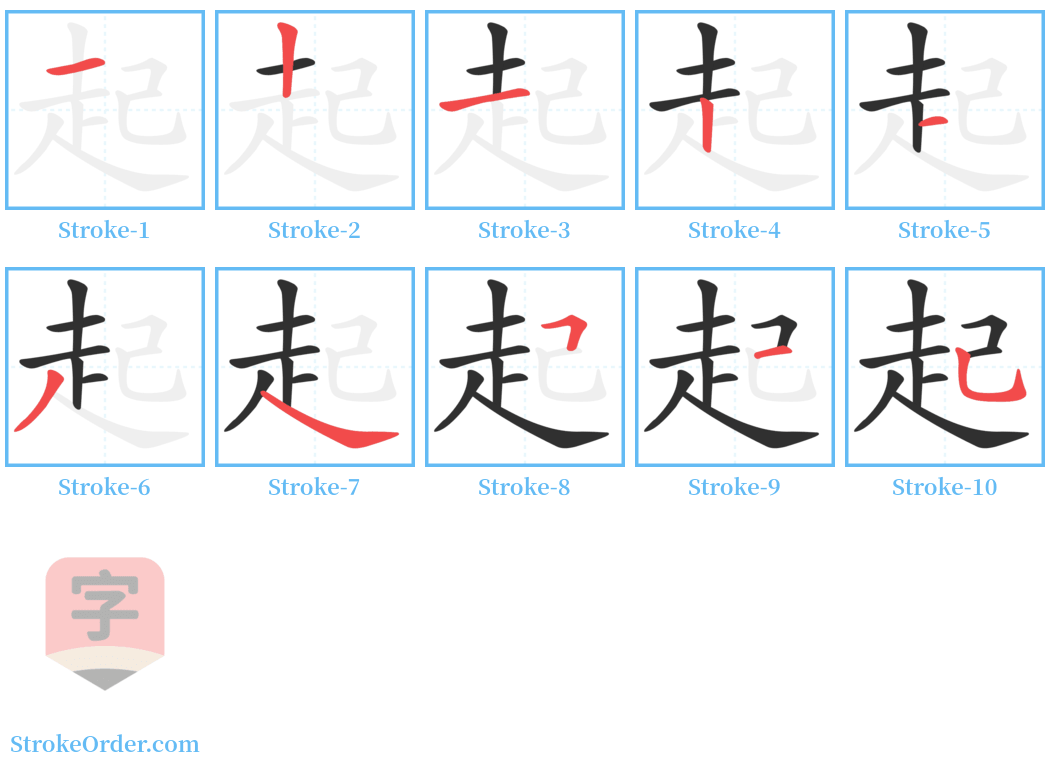起 Stroke Order
Animated Stroke Order of 起

Stroke Order Diagrams for 起

Step-by-Step Handwriting Guide for 起

Learn to Write Chinese Characters with Video Tutorials
Watch the video of writing the Chinese character "起", learn the correct stroke order (笔顺) of the character "起", and master the standard way of writing the character "起".
Free Printable Handwriting Practice with Stroke Order: 起
Printable Writing Practice Worksheet of "起" in Portrait Orientation (Tian Zi Ge)

Printable Writing Practice Worksheet of "起" in Landscape Orientation (Tian Zi Ge)

Information of 起
Pinyin
qǐ
Radical
走
Strokes
10 strokes
Usage
★★★★★
Definition
to rise / to raise / to get up
起 [qǐ]
动词
1. 由躺而坐或由坐而立等。
[En.] to rise (from lying or sitting)
2. 离开原来的位置。
[En.] to leave the original position
3. 开始。
[En.] to start; to begin
4. 拔出,取出。
[En.] to pull out; to take out
5. 领取(凭证)。
[En.] to collect (documents, certificates)
6. 由下向上,由小往大里涨。
[En.] to rise from lower to higher; to grow from small to big
7. 发生,产生,发动,提出。
[En.] to occur; to happen; to initiate or propose
8. 长出。
[En.] to sprout; to grow
9. 拟定。
[En.] to draft
10. 建造,建立。
[En.] to build; to establish
11. 群,组,批。
[En.] group; batch
12. 量词,指件,宗。
[En.] measure word for events or matters
13. 自,从。
[En.] from; since
14. 用在动词后,表示动作的趋向。
[En.] used after a verb to indicate the direction of the action
15. 用在动词后,与“来”连用,表示动作开始。
[En.] used after a verb with "来" to indicate the beginning of an action
16. 用在动词后,常与“不”或“得”连用,表示胜任;亦表示达到某一种标准。
[En.] used after a verb, often with "不" or "得", to indicate capability; also indicates reaching a certain standard
量词
1. 群;组。
[En.] group; lot
2. 批。
[En.] batch
3. 次,回。
[En.] time; instance
4. 病例;案例。
[En.] case; instance
介词
放在时间或处所词的前面,表示始点,相当于“从”、“自”、“由”。
[En.] placed before a time or place word to indicate the starting point, equivalent to "from" or "since".
副词
1. 用在动词后作为补足语,表示动作的向上方向。
[En.] used as a complement after a verb indicating the upward direction
2. 用在动词后,常与“不”、“得”连用,表示能或不能经受住,够或不够标准。
[En.] used after a verb together with "得" or "不", indicating capability or inability to meet a standard.
lit. to set up a separate kitchen (idiom); to start from scratch / back to square one / to start of on a new path
to rise abruptly (to a towering position) / to tower over / to spring up / to emerge suddenly / the emergence (e.g. of a power)
Input Method for 起
Pinyin
qi3
Wubi
fhnv
Cangjie
goru
Zhengma
boyy
Four Corner
47801
Unicode
U+8d77
Same Pronunciation Characters